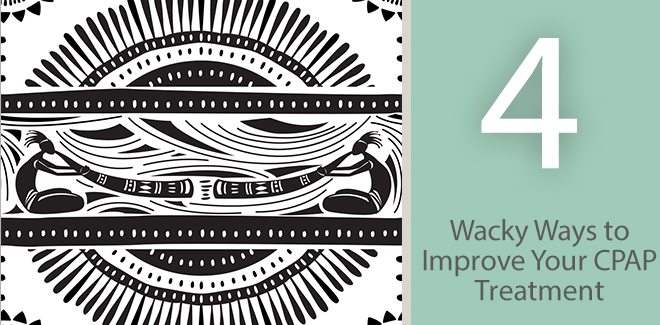
It’s no big mystery that CPAP therapy can wildly change your life by reducing the symptoms of obstructive sleep apnea. “Hallelujah!” is what you’ll be saying when you don’t feel like falling asleep at the wheel on the way to work in the morning. It’s the reason why CPAP therapy is the most prescribed treatment option for the sleep disorder. So far, we have talked about some ways to better adapt to treatment, but what if there are a few ways to boost the effectiveness of CPAP therapy? Here are some wacky, wild and out of the box ways to get just a little more from CPAP treatment.
Play The Didgeridoo
When you hear the word didgeridoo, you can almost instantly imagine the sound: those long bass-like reverberations that seem to rumble from the earth, like a native war cry that makes you strangely hungry for a Bloomin’ Onion. You may also be imagining the Australian Outback, “Crocodile” Dundee, and maybe even Hugh Jackman and Nicole Kidman (yes, they are both Australian). But did you know the didgeridoo, which is a long cylindrical wood instrument developed by Indigenous Australians thousands of years ago, may also help improve your sleep apnea? A study that was published in the British Medical Journal shows that playing this instrument for just twenty-five minutes a day can improve daytime sleepiness and reduce the symptoms of obstructive sleep apnea. So, you may want to think about picking up this instrument and start practicing – you may drive your spouse insane, but at the same time, it may just save your marriage; can you imagine a night without snoring?
Skip the Nightcap
If you are the kind of person that likes to have a relaxing nightcap right before bed, you may want to get in the habit of sticking to water on the rocks instead of a splash of whiskey. Out of all the things that can make sleep apnea worse and potentially hinder CPAP’s ability to treat the sleep disorder, alcohol will definitely do the trick. Your throat muscles are already relaxed enough when you sleep, so you don’t need to make them even more relaxed by having a drink. If you can, you want to reserve your drinking for cocktail hour – that way your body can properly digest and process the alcohol. On the other end of the spectrum, you also want to stay away from drinking caffeine right before bed. Anything that can disrupt your natural sleeping patterns can also disrupt continuous positive airway pressure therapy.
Work Out Your Tongue
The sixth sick sheik’s sixth sheep’s sick – say this tongue twister out loud a few times and you have official completed a tongue exercise. Our tongues are an important part of the sleep apnea equation, because the tongue is directly related to the disorder. Sleep apnea sufferers basically have an enlarged muscle at the base of their tongues that closes the airway passages during sleep – when the muscle is the most relaxed. It doesn’t happen during the daytime, because we have full mobility of our tongues during our waking hours. And it is during the daytime that sleep apnea sufferers may want to move around their tongues – by lifting it, reciting tongue twisters, and trying to stick it out as far as possible. You may not realize it, but the tongue is a muscle, just like your biceps and forceps, so it is important to strengthen it. By doing this, you can literally reshape your tongue, so it fits a little more snugly in your mouth and improves the effectiveness of CPAP treatment.
Strap a Tennis Ball To Your Back
This may sound absolutely insane – and it should – but strapping a tennis ball to your back is actually a great way to improve your sleep and reduce the symptoms of sleep apnea. How is this possible? Well, when you have a tennis ball on your back, it pretty much forces you to sleep on your side, which most doctors recommend for optimal sleep and uninterrupted breathing. When you sleep on your back, it can cause the muscles in your throat to further block your airways, which can worsen sleep apnea and its symptoms, like snoring. All you need to do is take out your favorite sleeping shirt and strap a tennis ball onto to the back – a strip of duct tape will do the trick. Yes, you’ll look and feel slightly insane with a bright green tennis balled taped to your back, but in the name of good health, it will be well worth it. Just make sure your dog doesn’t try and rip it off and beg you to play fetch.
In the end, obstructive sleep apnea can put a damper on your entire life, but luckily, CPAP therapy can reduce all the symptoms and help you sleep soundly at night. But if you want to further increase the effectiveness of your CPAP treatment, you may want to think about a few of the aforementioned wacky tips and tricks to boost your sleep apnea fighting powers. And a final word of wisdom: try not to do all at once, because sticking your tongue out and reciting gibberish whilst playing the didgeridoo with a tennis ball strapped to your back may not go over so well with the neighbors.










